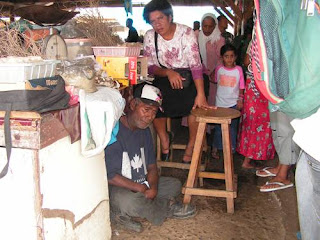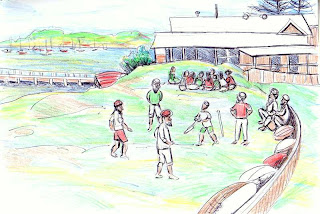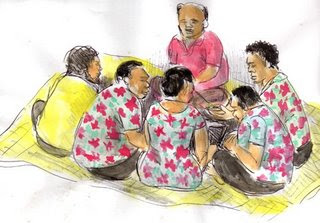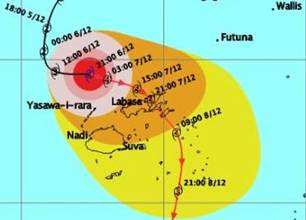from Peceli,
I knew him well when I was young.
from
Fiji Times feature article today:
Dad's early struggles shape his characterSunday, December 02, 2007
SACRIFICES and struggles endured by Gurbachan Singh in the 1940s after arriving in Fiji from India definitely shaped and moulded the character of his youngest son Charan Jeath Singh, who clearly remembers his dad as a committed and honest businessman. Such childhood exposure taught Mr Singh to be honest and dedicated to achieve goals put down by one. "My dad did not come with the indentured labourers but arrived later to look for better jobs and better pay in Fiji," he said. "One of the first jobs he got was at Suva where he worked for a cocoa and copra manufacturing company known as Brown and Joskey"After working in Suva for about three years, he moved to Labasa and became a salesman and later started his clothing company as a hawker and that's where I saw how dedicated my dad was to his business," Mr Singh said. "At the time, there were no vehicles, so people had to walk if they wanted to visit other places away from their homes and do business.
"My dad was one of those people who walked with baskets of clothes to sell house to house beginning from Wainikoro to Dreketi (Macuata) braving the hot sun and heavy rain. "And he did this for us, his children and how I admired him so much because my mum was not working and she stayed home to be with the children."
He clearly remembers the young days of helping his mum at home and in running their small grocery store that they had opened. The earnings from his dad's small business put the 11 siblings through the education system.
"I take my hat off to my dad and just respect him and love him so much for all the dedication and sacrifices he put up for his children to get a successful future like where I am today.
"Without the hard work of my dad, I don't think I would have reached this far because after all, he sent me to the New Zealand College of Aviation in Auckland, costing him $15,000 in fees to pay, which was so much money those days," Mr Singh said.
"My dad managed to take us as far as tertiary education, including the pilot school and that's from selling clothes, imagine that?
"That is why I just use that as an encouragement and guidance to help me through business and more importantly it teaches me to be committed no matter what the circumstance," Mr Singh said.
He attended the aviation college in 1980 after completing primary and secondary education at the Saint Mary's Primary School, All Saints Secondary School and Labasa College from 1968 to 1979. After completing his secondary education, Mr Singh went straight into flying school and graduated in 1982 with a private and commercial piloting license. "I worked for Air Fiji and Air Pacific, which included flying international routes.
"It was a good experience for me before leaving for the business arena.
"And I used to share with my dad about being a pilot and how it can make you nervous when there is bad weather but he always advised me to not give up anytime, even if it's a stormy weather because sooner or later the situation will calm down and I use this saying a lot in making decisions for my business," Mr Singh said. "He suggested that if I wanted to be a millionaire then I needed to leave my flying career and look at seriously doing business and he was not wrong," he said.
----
And a second article by Serafina, the Labasa journalist:
A millionaire who walks around town in shorts
SERAFINA QALO
Sunday, December 02, 2007
With a personal worth of $30-million, no one can tell that as Charan Jeath Singh goes on his daily walk through the streets of Labasa Town.
With a plain white Tee-shirt that he labels as a favourite, and a pair of shorts and slippers on his feet, any first timer to Labasa can never tell that the man who walks in town every morning and evening is worth more than a million dollars.
Born in Suva but raised in Labasa, his parents mum Raj Kaur and dad Gurbachan Singh came from India in 1935 from Gosal, in Punjab.
Mr Singh is the youngest and twin brother of a sister of 11 children, most of whom are business people. But although the youngest, Mr Singh has never depended on advice from his siblings as he believes determination and commitment towards a goal always sees one through.
This is how he started his business ventures in 1989 after being a domestic pilot of five years, flying for Air Pacific and Air Fiji.
The vision of becoming business leader took root amid the political turmoil of 1987.
It was a time when many Fiji-Indians were worried about their future here, selling their properties cheaply to migrate.
"There was such a big panic that everyone wanted to leave and go away from Fiji, even selling their properties at low price and moving out of the country," Mr Singh said.
"At the piece of land the Countdown Supermarket sits on used to have a Government building, including the Commissioner Northern's office and that same year, government advertised that it wanted to lease the land.
"I had a vision that despite the coup, things would get better, there will always be sunshine after the rain and so I got a business partner, the late Ratu Soso Katonivere, the father of the Tui Macuata, Ratu Aisea Katonivere."
Mr Singh said they initiated a joint venture they called the Charan Katonivere business' and developed the area.
"We borrowed from FDB and basically this is how my interest started in business and when things were finalised in 1989, I resigned from flying.
"But things were not easy in the beginning because when news broke out that I and the chief were doing a joint venture there were a lot of objections and jealousy from other business community," Mr Singh said.
He said they battled the obstacles and went ahead with the joint venture.
"We crossed the hurdle of the business community and there was another one which was a department belonging to the military that refused to move out of this building.
"So it took us a long time to get them out but we managed and we started operations from the building" Mr Singh said.
Business went well for the company which opened a supermarket.
But in 1995, Mr Singh's business partner, Ratu Soso, preferred to pull out of business as he had commitments to the vanua and preferred to spend more time in such area with the family.
"Old age was catching up with Ratu Soso and we had a good discussion where he told me that he preferred to have cash in his hand rather then having shares so we both agreed and all dues were paid to the chief and that's when I started venturing into the business world alone.
"Then I built a new building, changing it to a concrete one and started first with the supermarket, then the extension to house another three shops, then we built a milk bar in the supermarket and a restaurant upstairs," Mr Singh said.
The Oriental restaurant, is well known to many in Labasa and is considered a posh eatery in the town where many cocktail parties and functions have been held. Mr Singh said being a businessman was not difficult except that one needed to be committed and dedicated to the running of the business.



















